
This is part 1 of a multi-series critique of Metamodernism. For more info on the series check out the intro here. I’ll update this header with links to the next parts in the series and with the podcast with Brendan Graham Dempsey on Metamodern Spirituality afterwards.
Previous instalments: Intro, Part 1, Part 2, Part 3, Part 4, Part 5, Part 6.
Metamodernism is a strange term. Is it an art movement? Or a period in history — a term that captures the geist (spirit) of a zeit (time)?
Of course, these two things aren’t mutually exclusive. But the terms Postmodern and Metamodern are thorny in a way that Baroque and Neoclassical are not.
The relationship between the Baroque and the 17th century is transparent. Like shoulderpads and perms in the 80s, Baroque tells us something about aesthetic tastes of a particular historical moment. But nobody speaks of the contemporary Scientific Revolution as a manifestation of Baroquialism. Nor do we speak of the Industrial Revolution in terms of Neoclassicism.
In the case of Baroque and Neoclassical, the signified is transparent: it relates to art. But with the unfortunate naming of “Modern Art” the cup of the signified overflowed (though, to confuse matters, Modern Art is rather Postmodern in its sensibility but we’ll leave that urinal dangling for another day).
There is art and there is history. We can speak of art movements nested in history but it is unusual to speak of the reverse. Metamodernism does just this. Of course, the original sin can be traced back beyond Metamodernism. Jean-Francois Lyotard plucked the term “Postmodernism” from art history (architectural theory to be precise) and then Frederic Jameson historicised it. Lyotard was being playful and he regretted its memetic evolution. The Postmodern philosopher invoked Postmodernism as a “scepticism of grand narratives”. Then, in the hands of the Marxist cultural theorist Jameson, it became a new period in a grand narrative. And so the idea of Postmodernity was born — the age which comes after modernity.
The two Dutch art scholars who kickstarted the Metamodern movement with their 2010 article in the Journal of Aesthetics & Culture titled Notes on Metamodernism merely recapitulated the error (as I see it) of Lyotard and Jameson. Vermeulen and van den Akker noted an emerging sensibility in the art that moved beyond the ironic detachment of the Postmodern and into a new earnestness on the far side of irony.
Had Vermeulen and van den Akker chosen a term like Neo-Ironism for the art trend they had identified then this confusion wouldn’t exist. But, they were the original smugglers of oversized intellectual baggage. Being downstream of Marxian periodisation-ism (which is of course Hegelian in its roots) they chose the term Metamodernism. They couldn’t resist the memetic move and so we are left with talk of a Metamodern Zeitgeist.
What the cultural studies crowd failed to anticipate however was that this naming convention enabled the revivifying of Wilberian Integral Theory and its New Age X Developmental Psychology Hegelianism (stripped, thankfully of much New Ageism). The Integral crowd snuck into the cultural studies nest, parasitically infecting and commandeering the host movement. Ironic sincerity and pragmatic idealism got welded to systems thinking, Process Ontology and the post-Piagetian Map of Hierarchical Complexity. Whitehead, Wilber and de Chardin were smuggled to memetic rebirth.
A chasm was crossed. On one side: an artistic trend; on the other: a grand historical narrative. The bridge between them: an accident of terminology and raw, sticky memetics.
One wonders what might have happened if Modern Art had been given a less historical-sounding name. Where would our Metamodernism and Postmodernism be then? Perhaps we could have enjoyed the irony of both moments without the ontological baggage they brought in tow (or at least allowed us a less romantic framing of this “metamodern” irony — more on that later). Or perhaps the Marxists’ fondness for periodisation would have led to analogous terms anyway. Who can say. For now we’re stuck with the reified metaphors “Postmodern” and “Metamodern”.
For any Metamodernists reading (or any other critical readers) I’d love to hear your thoughts on any blindspots, oversights, errors, distortions or strawmen you see in this or the following pieces. As I said in the intro this isn’t some polished piece of art but a wrestling to articulate something I sense. If I’m mistaken I’d love to know; future pieces can benefit from that knowledge.
Next:
Previous:

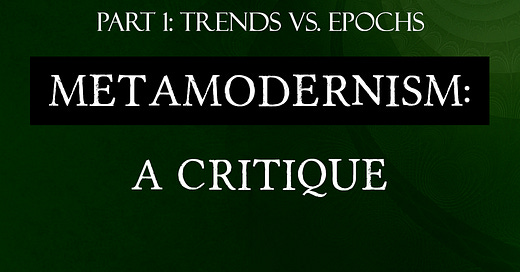




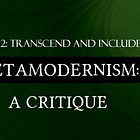
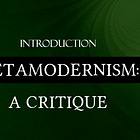





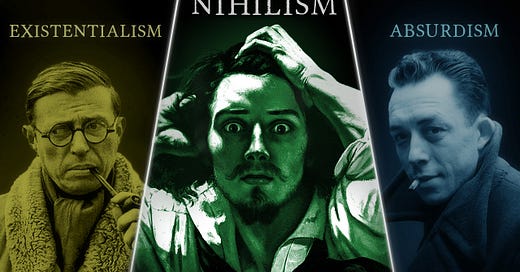



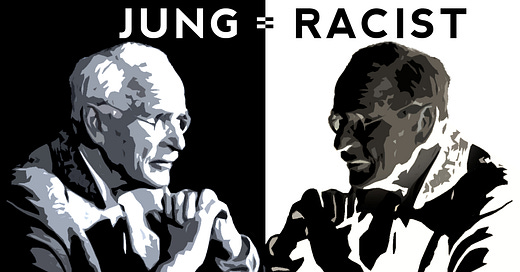

I tend to agree, with a nuance. Modernity is the era of industrial capitalism. Modernism is the academic discourse that sought to interpret modernity, often in terms of individualism, science, and technique (aesthetic, etc.). Modernity continues so long as industrial capitalism continues. Modernism - as more or less derivative of modernity, but not actually creating it - fell into disfavor sometime in the interwar period, e.g. Heidegger's move towards a kind of proto-postmodernism.
Just to state it upfront, Marx was a theorist of modernity, but not in the vein of the modernists, such as John Stuart Mill. Marx was what I call a counter-modernist, somewhat prefiguring the postmodern turn. I consider myself something of a revisionist Marxist, and I'll elaborate below to the degree that's relevant.
Postmodernism is a distinct stage of academic discourse, emerging out of modernist discourse but departing from it in terms of skepticism (objectivity is dependent on subjectivity), pragmatism (knowledge is subjective and pragmatic), and trangression (incongruity as aesthetic).
Modernity nevertheless continues onwards and postmodernism falls victim to its own inadequacies.
Metamodernism appears to try and transcend both postmodernism and modernism, but since all three are discourses that lack the critical power of Marxism, metamodernism is no more potent than its postmodern predecessor.
Marxism is a living tradition, not simply the distillation of Marx and/or Engels. As a counter-modernism with a practical politics at its core, the better Marxists never mistake discourse for revolutionary practice.
There is much to learn from all three periods of discourse, and Marxism has taken much from each era, whilst remaining focused on its core mission of fostering revolutionary collectives.
I lack the academic background and —frankly — the interest, to get in the weeds with Metamodernism theory. But I view Metamodernism as necessary to get out of this strangely fragmented dead end we seem to be stuck at.
We've reached the impasse pointed out by the postmodern critique — that modernity brought the capacity to build this amazing world but also destroyed any unifying vision and handed us the capacity to destroy at heretofore unknown scales. But postmodernism offers no fixes, only the critique. It's not all that useful. We need something that takes that critique and uses it to craft something better, to tell us what ends are meaningful and good. That's what I hope a future metamodernism can do.
In the "philosophy of science," things are grounded by measurements. It provides a solid "is," but no "ought." This tends to orient practitioners in a nihilistic direction. It's somewhat agnostic about what we should put technology toward. It's a kind of nihilism of social darwinism in which the only thing that's good is what's best at coming out on top in game theory.
The best philosophy/liberal arts are about relating to our emotions, desires, and thoughts in a way that's meaningful. The true, the good, and the beautiful become facets of an integrated reality emerging from an intuition of integrated metaphysics. It attempts to reify ethics and epistemology and helps inform individual and group choice making (the ought).
There's a bizarre siloing of the liberal arts and the sciences right now. Both are needed to make sense of society and our world.
Isn't it interesting that "Heart" — those who care the most have — have picket lines and handcuffs as their primary tools to fight for what's right, while "head" — has ...well, everything? We need to break open both silos and get them mixed.
I don't have solid proof of this, but I view the West to have had two major enlightenments — The Ancient Greek Enlightenment and the 16th century Pan-European one.
It strikes me that both mixed an "is" and an "ought." and brought them into harmony.
The Athenian ideal was that everyone should learn logic, history, the arts, math, etc, and that everyone should assess reality instead of parroting dogma. But it also added Socratic dialectic so everyone could understand others' perspective.
The 16th century enlightenment was a mixing of the scientific method with Hegelian dialectic.
Both mixings lead to a flourishing and some common views on reality.
I'm oversimplifying, and I'm not suggesting these tools were universally deployed, but I think that's the basic idea of what we need metamodernism.